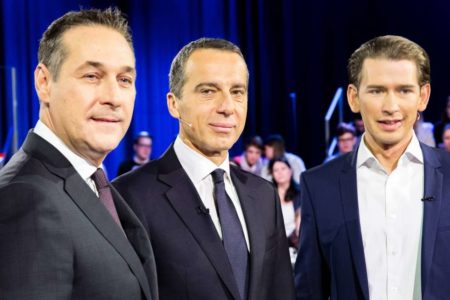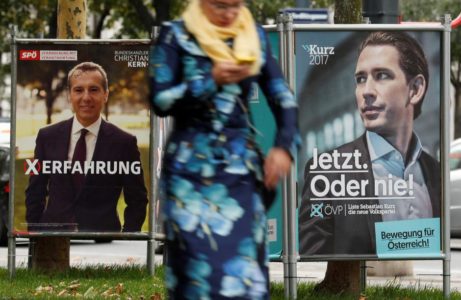Austropopulism
How Austrian politics shifted to the right
 Leaders of the main Austrian parties: Heinz-Christian Strache (FPÖ), Christian Kern (SPÖ) & Sebastian Kurz (ÖVP) (Blick)
Leaders of the main Austrian parties: Heinz-Christian Strache (FPÖ), Christian Kern (SPÖ) & Sebastian Kurz (ÖVP) (Blick)
During my study days in Austria, as every curious foreigner, I was very interested in comparing similarities and differences between Austria and my country. I had to get used to the bills being paid separately and waiters openly asking you about it, which is not a common practice southeast of the Austrian border. The bill being split could basically describe the politics of compromise that has been dominating Austria for so long, symbolised by the long-standing grand coalition of social democrats and the conservatives. This political cleavage has its strong historical roots, for which I would have to write a book rather than a blog post to explain. Nonetheless, the upcoming Austrian parliamentary elections on October 15th are bound to make a difference.
When I was thinking of a title for this post, I reflected on the many campaigns I have witnessed on Austrian streets, where classical grassroots, combined with the new importance of social media, have certain significance. Many of the gatherings, especially when organised by the right-wing parties, are dominated by a typical combination of traditional clothing, beer and something that is well-known in Austria as Austropop. This kind of cheesy pop music, which some Austrians despise, sometimes has lyrics addressing political issues and is expressed through a specific dialect. It is as populist as you can imagine.
The whole campaign for the elections could be seen as personalized, populist and very dirty, with the social democrats’ Facebook scandal dominating international media. The SPÖ was apparently behind the negative Facebook campaigns against Sebastian Kurz, and went to total war with the ÖVP. As a consequence, the SPÖ secretary general had to resign. It came as a massive shock to Austrians, unused to this type of campaigning. In terms of election chances, Sebastian Kurz and his rebranded conservative New People’s Party (ÖVP) is set to win, with the nationalist Freedom Party of Austria (FPÖ) and the struggling Social Democratic Party of Austria (SPÖ) fighting for second place. The Greens, liberal NEOS and leftist Peter Pilz’s list are also expected to enter the parliament.
Last summer at the European Forum Alpbach, while having a coffee with my colleagues, we agreed that in the long-run, Sebastian Kurz will become the Chancellor of Austria. He is a frequent guest in that small Tyrolean village, and his charisma was widely noticeable in the local tavern after the conference, where he enjoyed a glass of beer, talking to people and taking selfies with many of his fans. The 31-year old Viennese native is the incumbent foreign minister of Austria, and has gained in popularity through his handling of the 2015 European migrant/refugee crisis, when he closed the so-called Balkan route. This was strongly supported by Austrian tabloids, which have been catering to populist, anti-foreigner and Eurosceptic voices through selective journalism on topics such as security, foreigner crimes and EU policies.
Regarding EU policies, I still remember watching the news report about the 1999 elections that brought the notorious populist Jörg Haider into power through the coalition with the conservative People’s Party (ÖVP). As a result, silent sanctions were imposed to Austria by the EU states. Needless to say, those were different times, with the EU consisting of only 15 Member States. However, the opinion polls are suggesting that a Black (ÖVP) – Blue (FPÖ) coalition is likely to happen again.
When discussing the outcome of these elections, the year 2015 may turn out to have been a turning point, as the refugee/migrant crisis helped the nationalist Freedom Party of Austria (FPÖ) to gain the first place in the opinion polls. It strongly influenced the outcome of the 2016 presidential elections, which were followed intensely due to the context of Brexit and Trump. Back then, only the complete union of anti-FPÖ forces stopped the election of their candidate Hofer, who still won the preference of almost 50 percent of Austrian voters. At the time, Kurz figured out that it was now his time to shine. Promoting a right-wing agenda, he took away or moderated many ideas the FPÖ stood for, raising to the first place in opinion polls. Also, Kurz showed through coalition disruption who is the boss, by forcing the social democratic Chancellor Christian Kern to call the early elections, which will probably send the social democrats into the opposition benches.
With all this in mind, the upcoming Austrian elections will mark a significant shift in Austrian politics to the right, which is not so surprising due to the trends in Europe and Austria’s immediate neighbourhood. Basically, the real winner of these elections will be Heinz-Christian Strache and his FPÖ, who will be more influential than ever after these elections, by gaining important ministries and being aware that they have pushed the agenda in their favour. Even the SPÖ took a tougher role on migrant workers, despite many of them being their voters in the past.
It has been 18 years since Jörg Haider’s election gain. During that time Austria has changed a lot. Many young Austrian voters that do not remember the events of that time, nor were even born that year, are now eligible to vote. It will be interesting to see the final outcome, especially as Austria is preparing to preside over the Council of the European Union, starting from July next year.
 Election posters in Vienna, Austria (Reuters)
Election posters in Vienna, Austria (Reuters)
